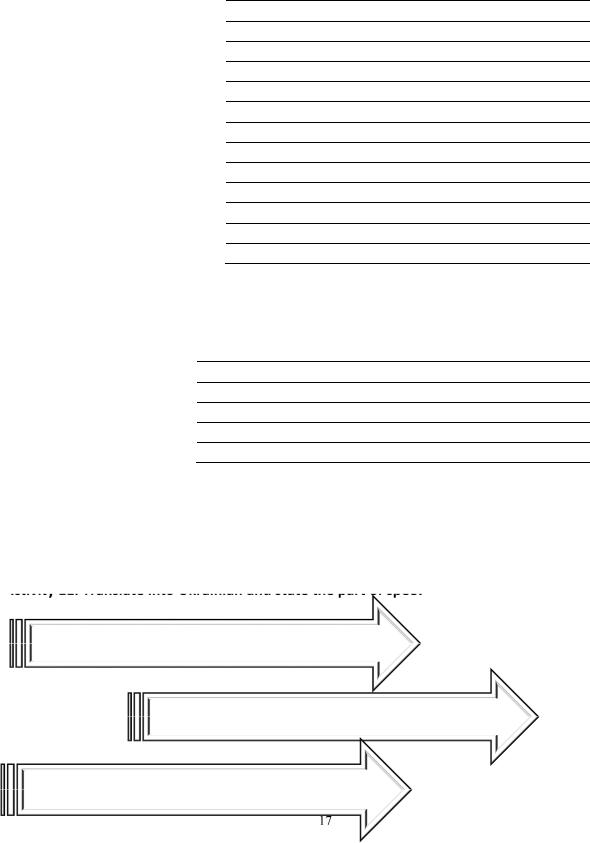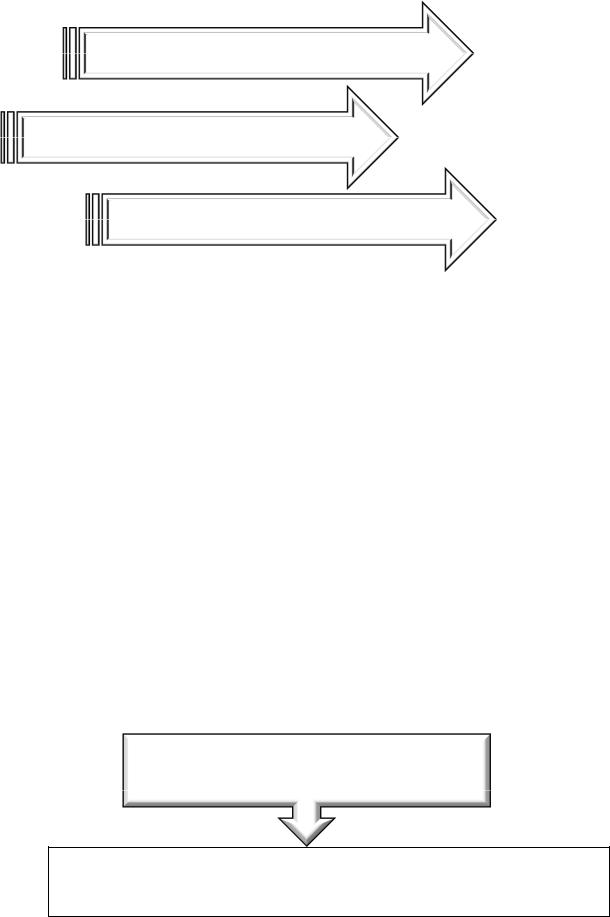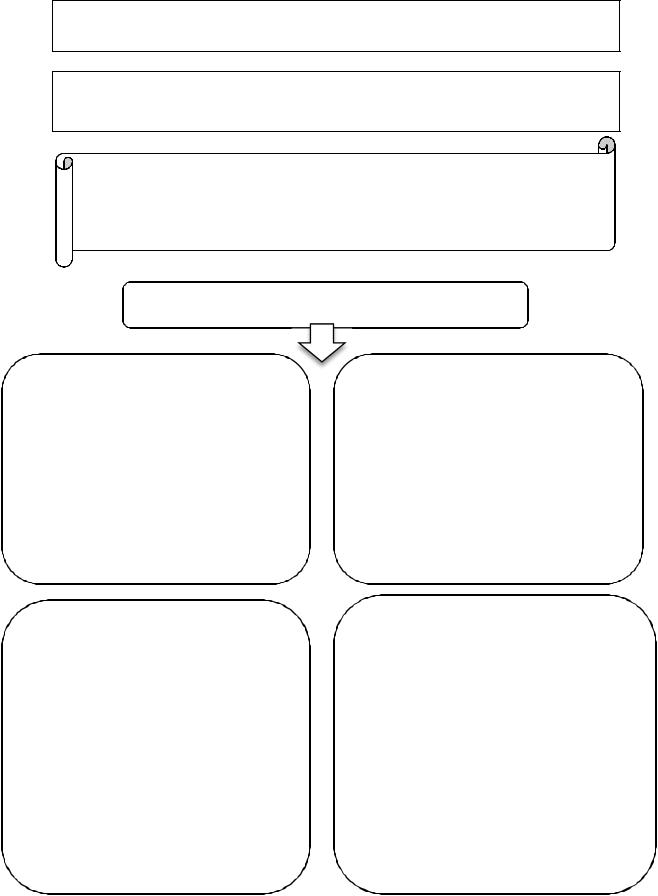
Зошит Англ мова СОЗ 3 курс 2 семестр
.pdfActivity 11. Translate into English using words and expressions from the text.
1.Люди є творцями вcix матеріальних i духовних цінностей людства.
2.Людина відкрила секрети природи i навчилася використовувати їх у повсякденному житті.
3.Люди винайшли безліч різноманітних машин, що полегшують їхню фізичну i розумову працю.
4.Автоматизація i ЕОМ згладжують різницю між фізичною i розумовою працею.
5.В епоху науково-технічного прогресу наука перетворилася на безпосередню виробничу силу суспільства.
6. |
Укpaїнські |
вчені |
роблять |
значний |
внесок |
у |
розвиток |
світової |
|
науки i в технічний прогрес людства. |
|
|
|
|
|||
7. |
Прогресивні вчені борються за мирне використання наукових відкриттів. |
|
||||||
|
|
|
|
|
|
|
|
|
|
|
|
|
|
|
|
|
|
|
|
|
|
|
|
|
|
|
|
|
|
|
|
|
|
|
|
|
|
|
|
|
|
|
|
|
|
|
|
|
|
|
|
|
|
|
|
|
|
|
|
|
|
|
|
|
|
|
|
|
|
|
|
|
|
|
|
|
|
|
|
|
|
|
|
|
|
|
|
|
|
|
|
|
|
|
|
|
|
|
Activity 12. Answer the following questions.
1.How has man changed the earth?
2.Who is the creator of the material and spiritual treasures of mankind?
3.What sources of energy did man discover and use in his life activity?
4.When did the first industrial revolution begin?
5.What made man's work easier and gave him time for creative work?
6.When does science become a direct productive force of society?
7.What are the consequences of the scientific-technological revolution?
8.What is the great progress of science illustrated by?
9.Did man use first energy of fire or atom?
10.The machine made a great contribution to the spread of information, didn't it?
Home task: _______________________________________________________________________
11

Заняття 3.
Тема Інфінітивний зворот з прийменником for. Telecommunications
The Prepositional Infinitive Complex
Інфінітивний комплекс може вводитися прийменником for; такий комплекс називається прийменниковим інфінітивним комплексом (The Prepositional Infinitive Complex)
Прийменниковий інфінітивний комплекс складається з іменника в загальному відмінку або особового займенника в об'єктному відмінку та інфінітива. Перша частина комплексу (іменник або займенник) позначає особу або предмет, що є суб'єктом або об'єктом дії,
вираженої інфінітивом: |
|
It’s time for us to go. |
Нам пора йти |
|
Функції прийменникового |
|
інфінітивного комплексу |
У реченні може бути:
is the happiest minute in my life.
з тобоюце найщасливіша хвилина в моєму житті.
виражений прийменниковим інфінітивним комплексом, здебільшого присудка, тоді речення починається ввідним it:
dangerous for us to be going out in this car.
think on. Про це тобі треба подумати.
her to speak.
заговорить вона.
here for him to play with.
з ким би він міг гратися.
мети або наслідку:
several examples for the students to understand the rule better. Викладач навів кілька прикладів, щоб студенти краще зрозуміли правило.
12

THE FOR-PHRASE
The for-phrase consists of three elements: the preposition 'for', a noun in the common case or a pronoun in the objective case and an infinitive, mostly in its Indefinite, Passive or Continuous form. The for-phrase has different syntactical functions in the sentence:
The Subject
it is (was, will be, would be) hard (easy, good, bad, important, impossible, not) for smb to do smth (for smb to be doing smth, for smth to be done):
1.It is not for me to say so. Не мені це казати.
2.It is unusual for a woman to be seen smoking. Жінку, яка палить, рідко можна зустріти.
3.It's silly for you to be asking me questions. Безглуздо, що ти задаєш мені запитання.
4.It is best for her to go back home. Їй краще поїхати додому.
5.It's easier for me to go out and buy a new multifunction device. Мені легше піти і купити новий мфу.
Exception
It is (was, will be) nice (kind, sensible, silly, stupid, actless) of smb to do smth:
1.It is very nice of you to go there. Гарно з твого боку піти туди.
2.It was silly of you to ask those questions. З вашого боку дивно задавати такі запитання.
3.It's nice of you to say so. Дуже гарно з вашого боку так сказати.
The Object
1.to long (to wait, to arrange, to mean, to be anxious) for smb to do smth:
1.I have arranged for you to have a private room.
Ядомовився, що у вас буде окремий номер.
2.I’m anxious for you to succeed. Я дуже хочу, щоб ви добилися успіху.
3.He did not mean for you to stay here. Він не розраховував, що ви залишитеся тут.
2.to make (to think, to believe) it difficult (easy, necessary,
important, best) for smb to do smth:
1. Your attitude made it difficult for him to tell you the truth.
Йому було тяжко сказати тобі правду через ваше відношення.
2. He thinks it best for you to stay there. На його думку, вам краще залишатися там.
|
|
The Attribute |
|
|
|
|
1. smb (anyone, nothing) |
for smb to do smth. |
|
|
|
1. There is nothing else for me to say. |
Мені більше немає що сказати. |
|
2.There is no one for the children to play with. Дітям немає з ким гратися.
|
2. man ( thing, time, place) |
for smb to do smth. |
|
|
|
1. It was the only thing for me to do. |
Це було єдине, що я міг зробити. |
|
2. It is not the right time for us to speak about it. Зараз не час нам про це говорити.
13

The Adverbial Modifier of Purpose
to do smth |
for smb |
to do smth: |
1. He stood aside for us to pass in. Він відійшов убік, щоб ми змогли пройти.
|
|
|
The Adverbial Modifier of Result |
||
|
|
|
|
|
|
|
|
(too) |
easy (difficult, young, old) |
(enough) |
for smb to do smth: |
1. |
|
|
|
|
|
The day was too cold and rainy for anyone to have a good time |
|||||
|
День був дуже дощовим і холодним, щоб хто-небудь міг гарно провести час. |
||||
2. |
The rain can last long enough for us to miss the train. |
||||
|
Дощ може йти так довго, що ми спізнимося на потяг. |
||||
Activity 1. Use for-phrases.
Model: He must be there in time. It's important.
It's important for us to be there in time.
1.You'll speak English with her. It'll do you good.
2.She is very late. It's rather unusual.
3.Don't make mistakes. It's important.
4.He explained everything. It was not difficult.
5.You ought to take a holiday now. It won't be difficult.
Activity 2. Complete the following sentences adding for-phrases to them.
Model: It should be better (you. to wear a coat).
It would be better for you to wear a coat.
1.It's not (you; to explain such things to him).
2.It's very important (children; to eat plenty of vegetables).
3.It'll be best (she; to see a doctor).
4.It might be just possible (you; to make him sign; the papers today).
5.It would be stupid (I; to pretend that I'm hungry).
6.It's very bad (growing boys; to smoke).
14

Activity 3. Translate into English.
1.З його сторони було нетактовно запізнюватися.
2.У нас дуже мало часу, щоб я міг Вам все розповісти.
3.Не тобі його критикувати.
4.На неї не схоже робити такі помилки.
5.З її сторони було безглуздо сперечатися.
6.Чому їй так хочеться, щоб ви виступили на конференції з телекомунікацій?
7.Вам буде цікаво прочитати цю книгу.
8.Головне - це, щоб Ви все зрозуміли.
Activity 4. The second person agrees with what the first one says. Use for and a to-infinitive.
Daniel: Andrew should take it easy. That would be best.
Matthew: Yes, you're right. It would be best for him to take it easy.
1.Trevor: Our new computer should arrive soon. I just can't wait.
Laura: Me neither. I______________________________________________________
2.Rachel: Matthew shouldn't marry Emma. It would be a mistake.
Vicky: I think so too.______________________________________________________
3.Customer: Advertisements should tell the truth. It's important.
Mark: I agree. __________________________________________________________.
Activity 5. Add a sentence with too or enough and: difficult, funny, heavy, high, hot, loud
?Mike and Harriet couldn't lift the piano. It was too heavy for them to lift.
?Tom won't repeat the joke. It isn't funny enough for him to repeat.
1.Emma can't reach the top shelf________________________________________________
2.We can't understand the poem________________________________________________
3.Not everyone could hear the music_____________________________________________
4.The tea had got cold. Daniel couldn't drink it______________________________________
Activity 6. Practise reading words with double stresses.
mathematics |
polytechnical |
fundamentals radiophysics technological |
indisputable |
||
economics |
organizational |
highly-qualified |
locomotive |
engineering |
|
|
|
15 |
|
|
|

Activity 7. Memorize spelling and pronunciation of the following words.
period [piǝriǝd]
success [sak'ses]
hydraulic [hai'dro:lik]
society [sǝ'saiǝti]
manufacture [mænju' fæktje]
cybernetics [,saibǝ:'netiks]
environmental [in,vaiǝr(ǝ)n'ment(ǝ)l]
acquirement [ǝ'k vaiǝrǝn’mǝnt]
Activity 8. Practise connected reading.
are concerned
to satisfy human needs
is characterised by
to be part of a team
they are well-trained
environmental
engineering and organizational efforts
in various areas of science and production
applied mathematics and cybernetics
different phases of the design process
a lot of engineering and organizational efforts
Activity 8. Read and translate the text.
THE DESIGNING ENGINEER
Practical applications of the developments of physics, mathematics and other sciences are realized by engineers. The engineer, designing engineer is the main motive power of the technological progress. Engineers concern themselves with the application of science and technology to satisfy human needs. In their work they are guided by the latest achievements of science and technology.
What is the role of an individual engineer in it? He may be responsible for the complete process. It is far more usual, however, for him to be part of a team, consisting not only of engineers, and concern himself only with his speciality and its interaction with the total project.
Before this moment a lot of engineering and organizational efforts were applied. The designing engineer cannot do without knowledge or information in many fields other than those of engineering. In fact, most of the branches of engineering are closely related with one or more sections of physics. Civil engineering, for instance, applies the principles of mechanics, mechanical engineering utilizes the laws of mechanics and heat, electrical engineering is based on fundamentals of electricity, etc. One of the tools common to physics and engineering is mathematics. Physics and mathematics are thus the basic "foundations of engineering". In his practical work the designing engineer is faced with the importance of choosing suitable engineering materials. They must be highly reliable and most economical. In recent years, as we know, some materials are scarce so the engineer must be able to select substitute materials.
16

Thus a modern engineer must get a substantial training in subjects of his speciality as well as in such subjects as applied physics and mathematics, chemistry, computers and robotics, environmental engineering, systems engineering, computer-aided design, research-on-research, management science, etc. He must have a scientific attitude, imagination, initiative and good judgment. In fact, it is often the engineer's reading of constraints and criteria in areas unfamiliar to him that decides the final success of his design.
VOCABULARY NOTES
motive power —
to concern oneself (with) — to be guided (by) — environmental engineering — system engineering — research-on-research — management science — substantial training —
deep knowledge — broadly speaking — fundamentals of sciences — areas unfamiliar to smb.— a lot of (many/much) —
to be faced with —
Activity 9. Translate the following Noun + Noun combination into Ukrainian.
motive power world science
computer technology materials science institute graduate mechanical engineering
Activity 10. Read the following international words and give their Ukrainian equivalents.
industrial, culture, design, process, technology, optimization, resource, fact, institution, realize, basis, production, complex, communication.
Activity 11. Translate into Ukrainian and state the part of speech of the following words.
to explore — explorer — exploration — explorative
to invent — inventor — invention — inventive
to generate — generator — generation — generative

to educate — educator — education — educative
to apply — applied — application — applicable
to reduce — reducer — reduction — reductive
Activity 12. Choose English equivalents of the following Ukrainian words.
конструкція |
___________________ power |
пристрій |
___________________ equipment |
впровадження |
___________________ production |
сила |
___________________ foundation |
виробництво |
___________________ device |
основи |
___________________ design |
устаткування |
___________________ implementation |
Home task: _______________________________________________________________________
Заняття 4.
Тема Неособові форми дієслова. Герундій. Телекомунікації
Герундій — це неособова форма дієслова із закінченням ing, що має властивості дієслова й іменника.
Як і інфінітив, герундій називає дію: reading читання, listening слухання.
В українській мові немає форми, яка відповідала б герундію. Слова читання, слухання — Іменники, що утворились від дієслів, але не мають граматичних ознак дієслова.
ДІЄСЛІВНІ ВЛАСТИВОСТІ ГЕРУНДІЯ
а) Герундій перехідних дієслів вживається з прямим додатком:
I like reading books. |
Я люблю читати книжки. |
She began preparing food. |
Вона почала готувати їжу. |
18

б) Герундій може мати означення, виражене прислівником :
They continued listening attentively. Вони продовжували уважно слухати.
в) Герундій має неозначену й перфектну форми, вживається в активному і пасивному стані. За формою герундій збігається з відповідними формами Present Participle.
|
Аctive |
Passive |
Indefinite |
writing |
being written |
Perfect |
having written |
having been written |
Неозначена форма герундія вживається:
а) для вираження дії, одночасної з дією, вираженою дієсловомприсудком речення:
He sat without turning his head.
Він сидів, не обертаючись. She is interested in collecting
stamps.
Вона цікавиться колекціонуванням марок.
в) після дієслів to intend мати намір, to suggest пропонувати, to insist наполягати та деяких Інших Indefinite Gerund виражає майбутню дію по відношенню до дії, вираженої дієсловом-присудком:
He had intended writing him.
Він мав намір написати йому. He insisted on telling her how it
happened.
Він наполягав на тому, щоб розказати їй, як це сталося.
б) для вираження дії. безвідносно до якогось певного часу:
Seeing is believing. Бачити — значить вірити.
Addition is the process of finding the sum of two or more than two numbers.
Додавання — це процес знаходження суми двох або більш ніж двох чисел.
г) для вираження дії, що передує дії, вираженій дієсловом-присудком, зокрема після дієслів to thank
дякувати; to forget забувати; to remember пам'ятати, пригадувати; to excuse пробачати; to apologize
просити пробачення та ін., а також після прийменників on і after:
Thank you for helping me.
Дякую, що допомогли мені.
I don’t remember seeing either of them. Я не пам'ятаю, щоб я бачив
кого-небудь з них.
19

Activity 1. Translate into Ukrainian.
1.Repairing cars is his business.
2.It goes without saying.
3.Living in little stuffy rooms means breathing poisonous air.
4.Iron is found by digging in the earth.
5.There are two ways of getting sugar: one from beet and the other from sugarcane.
6.Jane Eyre was fond of reading.
7.Have you finished writing?
Activity 2. Complete each sentence with one of these verbs.
answer apply be be listen make see try use wash work write
1. |
He tried to avoid answering my question. |
||||||||||||
2. Could you please stop |
|
|
|
|
|
|
so much noise? |
||||||
3. |
I enjoy |
|
|
|
to music. |
||||||||
4. |
I considered |
|
|
|
|
for the job but in the end I decided against it. |
|||||||
5. |
Have you finished |
|
|
|
|
|
|
your hair yet? |
|||||
6. |
If you walk into the road without looking, you risk ______________ knocked down. |
||||||||||||
7. |
Jim is 65 but he isn't going to retire yet. He wants to carry on ___________. |
||||||||||||
8. |
I don't mind you |
|
|
|
|
|
the phone as long as you pay for all your calls. |
||||||
|
|
|
|
|
|
|
|
|
|
|
|
|
|
9. |
Hello! Fancy |
|
|
|
|
you here! What a surprise! |
|||||||
10. I've put off |
|
|
|
|
|
the letter so many times. I really must do it today. |
|||||||
11. What a stupid thing to do! Can you imagine anybody _________________ so stupid?
12. Sarah gave up |
|
to find a job in this country and decided |
to go abroad. |
|
|
Activity 3. Some friends have had a meal together in a restaurant. Put in the ing-forms. Use these verbs: change, discuss, eat, get, miss, ring, try, wait, walk
Vicky: Shall we go then?
Rachel: Daniel hasn't finished (►) eating yet. Daniel: It's OK. It's just a piece of chocolate. Matthew: Chocolate? After that enormous meal?
Daniel: I know. I've eaten too much. When I find something new on the menu, I just can't resist (1) _________________ it.
Rachel: How are we getting home?
Vicky: I don't mind (2) _____________________.I feel like some fresh air. Rachel: You're crazy. It's miles. And we've just eaten.
Matthew: I suggest (3)____________ for a taxi. It'll save (4)__________________around for a bus. Emma: Good idea. I couldn't face (5)____________ cold again after being in the warm all evening. Rachel: Yes, the bus journey is too complicated. It involves (6)_____________ buses in the centre.
20
